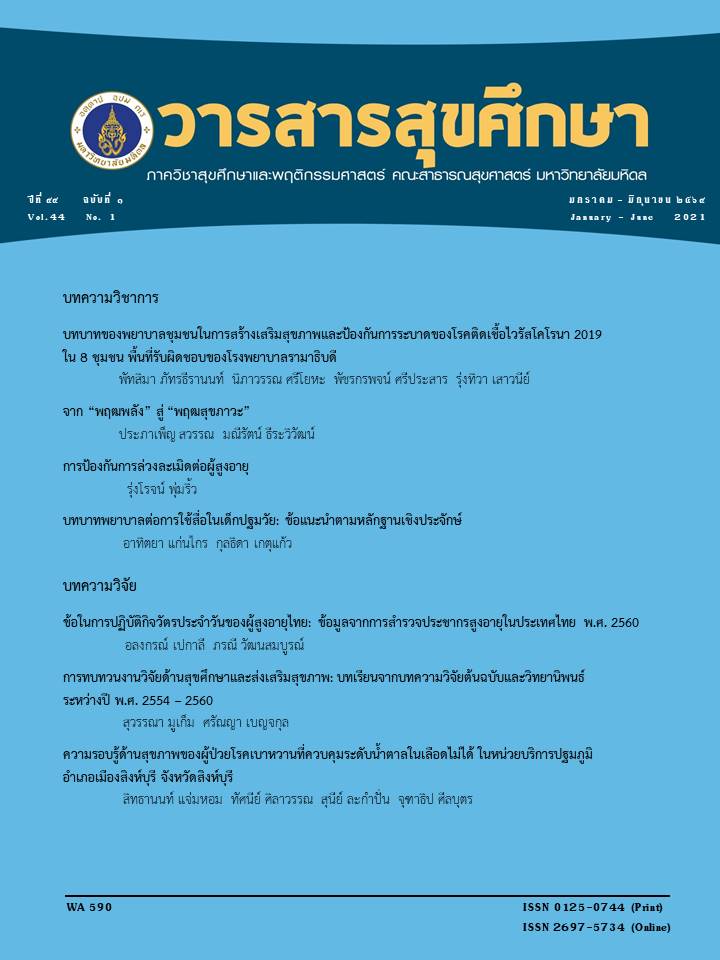บทบาทพยาบาลต่อการใช้สื่อในเด็กปฐมวัย: ข้อแนะนำตามหลักฐานเชิงประจักษ์
คำสำคัญ:
สื่อดิจิตัล, เด็กปฐมวัย, บทบาทพยาบาล, แนวทางการใช้งานบทคัดย่อ
การใช้สื่อหน้าจออิเล็กทรอนิกส์ในเด็กปฐมวัยปัจจุบันมีแนวโน้มเพิ่มมากขึ้นสัมพันธ์กับสถานการณ์โลกที่เปลี่ยนแปลงไป สื่อและเทคโนโลยีต่าง ๆ เข้ามามีอิทธิพลในการดำเนินชีวิตของเด็กอย่างหลีกเลี่ยงไม่ได้ สื่อเปรียบเหมือนดาบสองคมหากนำมาใช้อย่างไม่ถูกต้องอาจส่งผลกระทบที่รุนแรงต่อเด็กได้ทั้งในระยะสั้นและระยะยาว จากการทบทวนงานวิจัยที่ผ่านมาพบว่าการใช้สื่อหน้าจออิเล็กทรอนิกส์ในเด็กอายุน้อยกว่า 2 ปี จะส่งผลทางลบมากกว่าทางบวกต่อเด็กทั้งด้านร่างกาย อารมณ์ สังคม พัฒนาการ ภาษา พฤติกรรม การทำหน้าที่บริหารของสมองระดับสูง การเรียนรู้ สติปัญญา ภาวะสุขภาพ และคุณภาพชีวิต เพื่อป้องกันผลกระทบจากการใช้สื่อไม่เหมาะสมในเด็ก พยาบาลจึงมีหน้าที่ในการส่งเสริมการใช้สื่ออย่างถูกวิธีโดยประยุกต์ใช้ข้อแนะนำการใช้สื่ออิเล็กทรอนิกส์ในเด็กปฐมวัยร่วมกับบุคคลที่เกี่ยวข้องในการดูแลเด็ก ทั้งพ่อแม่ ผู้ปกครอง ผู้ดูแลเด็ก ครู พยาบาล และบุคลากรทางสุขภาพ ควรมีส่วนร่วมในการการป้องกันและเฝ้าระวังผลกระทบจากการใช้สื่อ ส่งเสริมการใช้สื่ออย่างถูกวิธี สร้างเสริมสุขภาพเด็ก ประสานงานร่วมกันในกับทีมสหวิชาชีพเพื่อให้เด็กได้รับการจัดการดูแลและเฝ้าระวังให้มีการใช้งานสื่ออิเล็กทรอนิกส์อย่างเหมาะสม เพื่อให้การใช้สื่อเกิดประโยชน์สูงสุดและเกิดผลเสียจากการใช้สื่อน้อยที่สุด
เอกสารอ้างอิง
2. Hockenberry MJ, Wilson D, Rodgers CC. Wong’s essentials of pediatric nursing. (10th ed). St. Louis: Mosby; 2017.
3. Bronfenbrenner U. Ecological models of human development. In: Gauvain M, Cole M, (editors). Reading on the development of children. 2th ed. NY: Freeman; 1994. pp. 37-43.
4. พระราชบัญญัติกองทุนพัฒนาสื่อปลอดภัยและสร้างสรรค์ 2558
5. Chumprasert T, Wiroonpanich W, Wattanasit P. Relationships between the use of electronic media and the development of children aged 2-5 years in Public Child
Development Centers in Songkhla Province. The Southern College Network Journal of Nursing and Public Health 2019;6(2):91-104. (in Thai)
6. Tansriratanawong S, Louthrenoo O, Chonchaiya W, Charnsil C. Screen viewing time and externalising problems in pre-school children in Northern Thailand. Journal of Child &
Adolescent Mental Health 2017;29(3):245-252.
7. Vijakkhana N, Wilaisakditipakorn T, Ruedeekhajorn K, Pruksananonda C, Chonchaiya W. Evening media exposure reduces night-time sleep. Acta Paediatr 2015;104(3):306-312.
8. Ebbeck M, Yim HYB, Chan Y, Goh M. Singaporean parents’ views of their young children’s access and use of technological devices. Early Childhood Educ J 2016;44(2): 127-134.
9. Günüç S, Atli S. Parents’ views on the impact of technology on 18 to 24-month old infants. Addicta: Turkish J Addict 2018;5(2):205-226.
10. Webster EK, Martin CK, Staiano AE. Fundamental motor skills, screen-time, and physical activity in preschoolers. J Sport Health Sci 2019;8(2):114-121.
11. Zhao J, Zhang Y, Jiang F, Ip P, Ho FKW, Zhang Y, et al. Excessive screen time and psychosocial well-being: The mediating role of body mass index, sleep duration, and parent-child interaction. J Pediatr 2018;202:157-162.
12. Brockmann PE, Diaz B, Damiani F, Villarroel L, Núñez F, Bruni O. Impact of television on the quality of sleep in preschool children.Sleep Med 2016;20:140-144.
doi: 10.1016/j.sleep.2015.06.005.
13. Hinkley T, Carson V, Kalomakaefu K, Brown H. What mums think matters: a mediating model of maternal perceptions of the impact of screen time on preschoolers' actual
screen time. Prev Med Rep 2017;6;339-345. doi: 10.1016/j.pmedr.2017.04.015.
14. Supanitayanon S, Trairatvorakul P, Chonchaiya W. Screen media exposure in the first 2
years of life and preschool cognitive development: a longitudinal study. Pediatr Res
2020;1-9.
15. Yang Y, Jin Z, Liu S, Jin X, Huang H, Tong S. Children’s social communication skills and
electronic screen exposure, perinatal, and other risk factors. J Public Health 2019;1-9.
16. McNeill J, Howard SJ, Vella SA, Cliff DP. Longitudinal associations of electronic application use and media program viewing with cognitive and psychosocial development in preschoolers. Acad Pediatr 2019;19(5):520-528.
17. Hinkley T, Verbestel V, Ahrens W, Lissner L, Molnar D, Moreno LA, Bourdeaudhuij ID. Early childhood electronic media use as a predictor of poorer well-being: a prospective cohort study. JAMA Pediatr 2014;168(5):485-492. doi: 10.1001/jamapediatrics.2014.94
18. Anderson DR, Subrahmanyam K. Digital screen media and cognitive development. Pediatrics 2017;140(2):S57-S61. doi: 10.1542/peds.2016-1758C.
19. Chassiakos YLR, Radesky J, Christakis D, Moreno MA, Cross C. Children and adolescents and digital media. Pediatrics 2016;138(5):e20162593. doi: 10.1542/peds.2016-2593
20. American Academy of Pediatrics. Media and young minds. Pediatrics. Pediatrics 2016; 138(5):e20162591.
21. Bozzola E, Spina G, Ruggiero M, Memo L, Agostiniani R, Bozzola M, et al. Media devices in pre-school children: the recommendations of the Italian pediatric society. Ital J Pediatr 2018;44(1):1-5.
22. Jabbar SA, Al-Shboul M, Tannous A, Banat SA, Aldreabi H. Young children’s use of
technological devices: parents’ views. Modern Applied Science 2019; 13(2).
23. Ihmeideh F, Alkhawaldeh M. Teachers' and parents' perceptions of the role of
technology and digital media in developing child culture in the early years. Child Youth
Serv Rev 2017;77;139-146.
24. Canadian Peadiatric Society. Screen time and young children: promoting health and
development in a digital world. Paediatr Child Health 2017;22(8):461–468.
doi: 10.1093/pch/pxx123
25. World Health Organization. Guidelines on physical activity, sedentary behaviour and
sleep for children under 5 years of age. World Health Organization, web annex: evidence
profiles. 2019;No. WHO/NMH/PND/2019.4.
26. Chonchaiya W, Sirachairat C, Vijakkhana N, Wilaisakditipakorn T, Pruksananonda C.
Elevated background TV exposure over time increases behavioural scores of 18-month-
old toddlers. Acta Paediatr 2015;104(10):1039-1046. doi: 10.1111/apa.13067.
27. Chonchaiya W, Wilaisakditipakorn T, Vijakkhana N, Pruksananonda C. Background media exposure prolongs nighttime sleep latency in Thai infants. Pediatr Res 2017;81(2):322-328.
28. Lin LY, Cherng RJ, Chen YJ, Chen YJ, Yang HM. Effects of television exposure on
developmental skills among young children. Infant Behav Dev 2015;38:20-26.
doi: 10.1016/j.infbeh.2014.12.005



